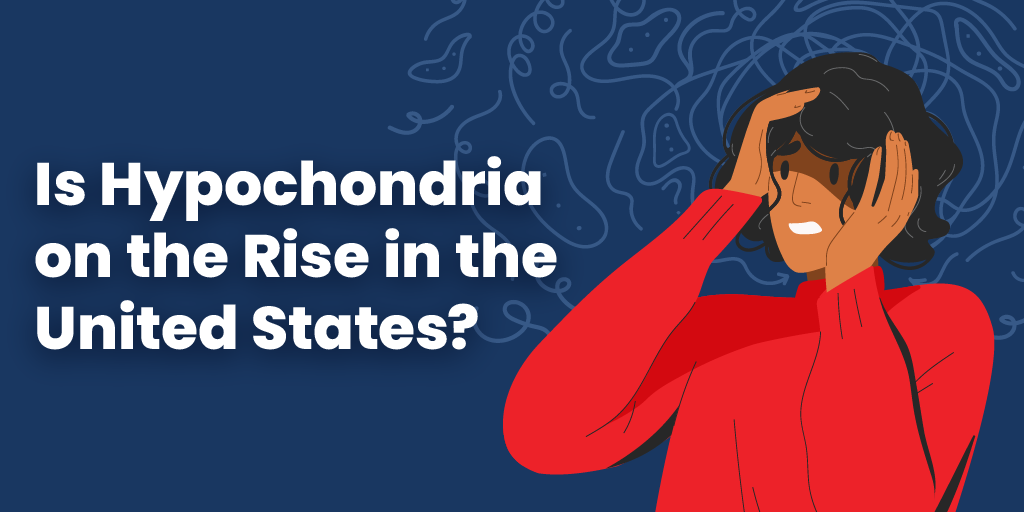
For people that experience health anxiety, Google can be a tricky place. In the age of WebMD, searching for our symptoms can sometimes bring more questions than answers. Pair this with the first international pandemic since the Spanish Flu, and it’s quite possible that hypochondria is increasing in Americans.
We here at CertaPet wanted to know more about health anxiety in America, so we surveyed people across the U.S. to get some hard evidence. What percentage of the population consider themselves to be a hypochondriac? How often are they “self-diagnosing” themselves, or even their pets, via the internet? How has COVID affected health anxiety? We collected information about all of this and more.
Methodology
The survey we sent out asked people in the U.S. questions about their experiences with health anxiety, like how often they experience it (if at all) and if that amount has grown in recent years, what the leading causes of it are, how it has affected their behavior, and if they treat their illnesses differently than their pets’. The survey was done over a week in November 2021 and had over 800 total participants.
Health Anxiety is on the Rise
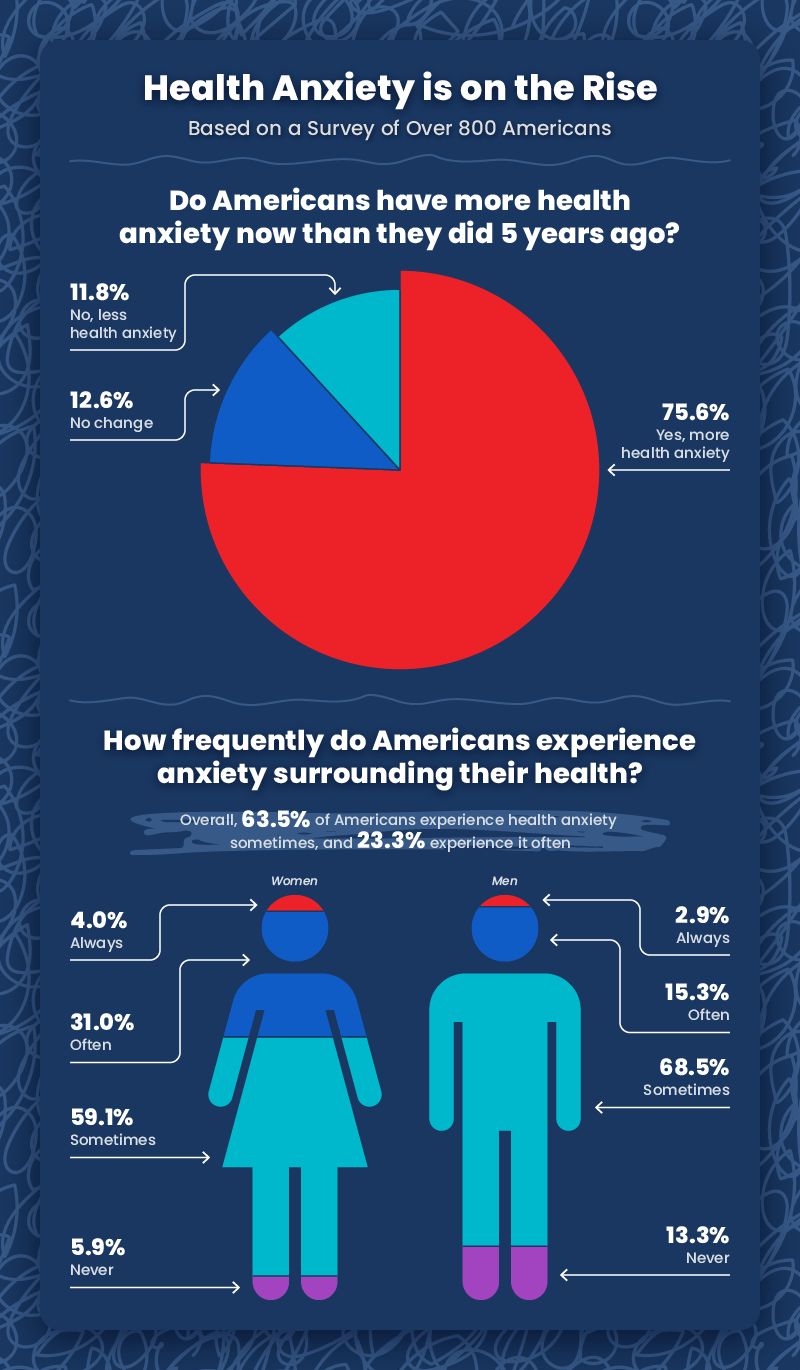
After looking at the data, it’s obvious that health anxiety among Americans is increasing, as 75.6% of Americans have more health anxiety now than they did five years ago. Regarding frequency, 63.5% say they experience health anxiety sometimes, 23.3% say they experience health anxiety often, and 3.45% say they experience health anxiety constantly. It’s safe to assume that some amount of all this health anxiety can be attributed to the pandemic, but it’s hard to give an exact percentage. We do have some pandemic-specific statistics that might give us a clue, but those are coming up a bit later.
There is an interesting gender takeaway to be found here as well. While men answered “sometimes” a bit more often than women, they also answered “never” over twice as much, while women answered “often” over twice as much in comparison to men. With 34.0% of women and 18.2% of men experiencing health anxiety at least “often,” it’s clear health anxiety plays a role in the lives of many Americans but women experience it more frequently, overall. Now let’s discuss why that might be the case.
Leading Causes of Increasing Health Anxiety
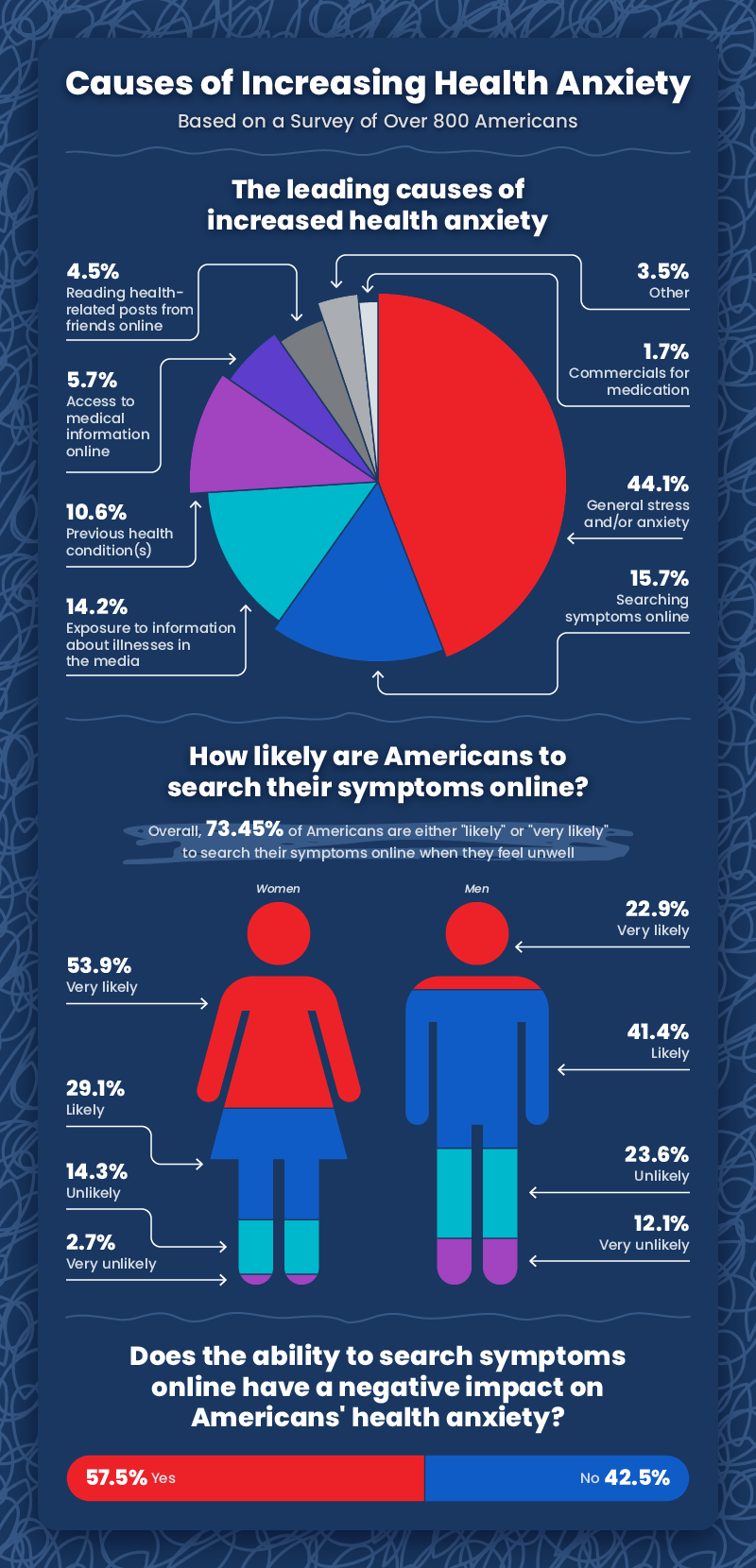
So what’s the leading reason behind this increase in American health anxiety? With a 44.1% piece of the pie, our survey says it’s “general stress and/or anxiety.” That’s close to half of all responses. Now again, some of this large amount can certainly be pinned on the pandemic, but it’s hard to know exactly how much.
Let’s take a look at some of the other health anxiety explanations that survey takers chose. For 14.2% of respondents, “exposure to information about illnesses in the media” is the leading cause of health anxiety, which is something that can probably be blamed almost entirely on the astronomical jump in disease-centered media coverage that came with COVID, but the other two double-digit percentage options, the 15.7% of people who said “searching symptoms online” and 10.6% of people who said “previous health condition(s),” are a bit more complex.
For starters, searching up symptoms on the internet wasn’t possible 25 or more years ago, so this 15.7% number is evidence of an increase in the number of people that experience health anxiety since at least the invention of the Internet. The 10.6% that blame a previous health condition, however, can’t really be pinned to any particular time period. People have always gotten sick, and surely that’s occasionally instated present and/or future health anxiety.
The smaller percentages here don’t account for much, but other than the 1.7% “commercials for medication” and 3.5% “other” options, every remaining factor can be pooled in with our hypothesis that the Internet has played a role in increasing health anxiety across America (5.7% of respondents identified “access to medical information online” as a leading factor and 4.5% of respondents selected “reading health-related posts from friends online” as contributing to their health anxiety).
The Impact of COVID-19 on Health Anxiety
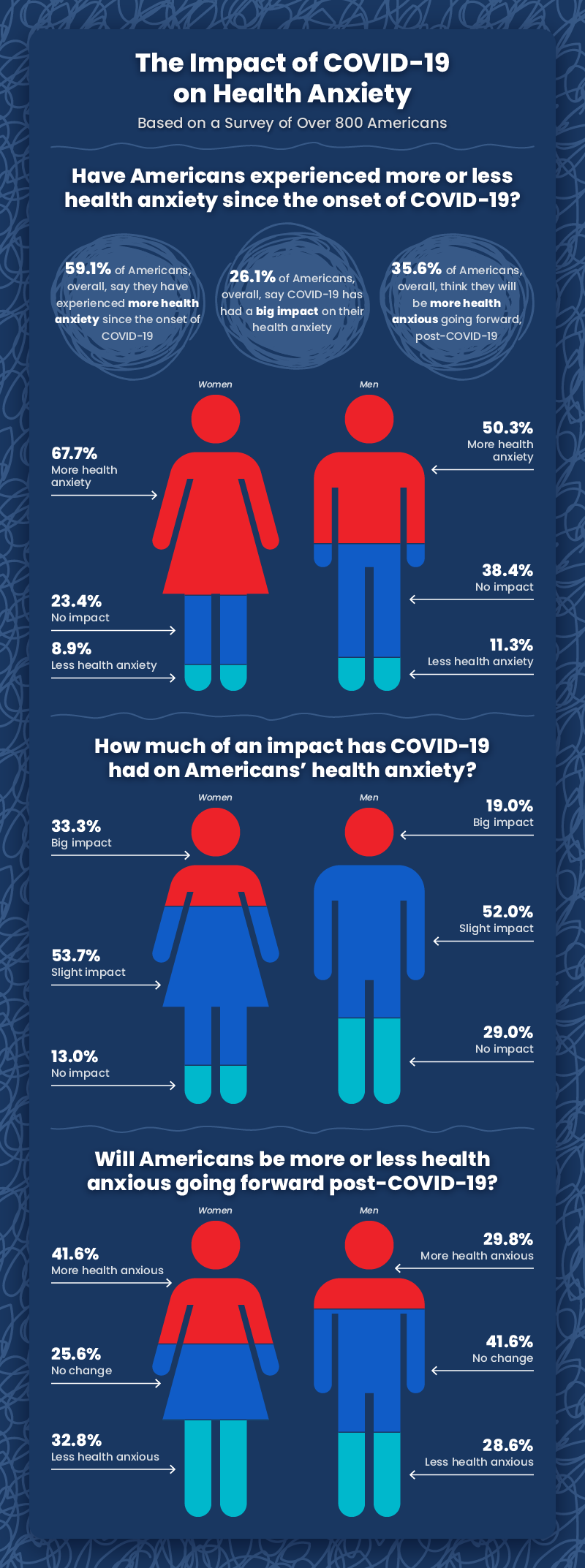
We’re finally at the pandemic-specific data, and it’s pretty much what we’ve been expecting. A whopping 59.1% of Americans say they’ve experienced more health anxiety since the beginning of the pandemic. If we look at women specifically, however, that number hits 67.7%, or just over two in every three American women. One in three American women even goes so far as to say COVID has had a “big” impact on their health anxiety.
Results are a bit mixed in the final row of charts, as both men and women are fairly split in how anxious they will be going forward post-COVID-19. This could be due to the uncertainty that the future inherently holds, or maybe some people think COVID potentially dying down will decrease health anxiety going forward while others believe the pandemic will have permanently changed perceptions of health by the time it’s finally over, if that time comes.
How Health Anxiety Impacts Our Behavior
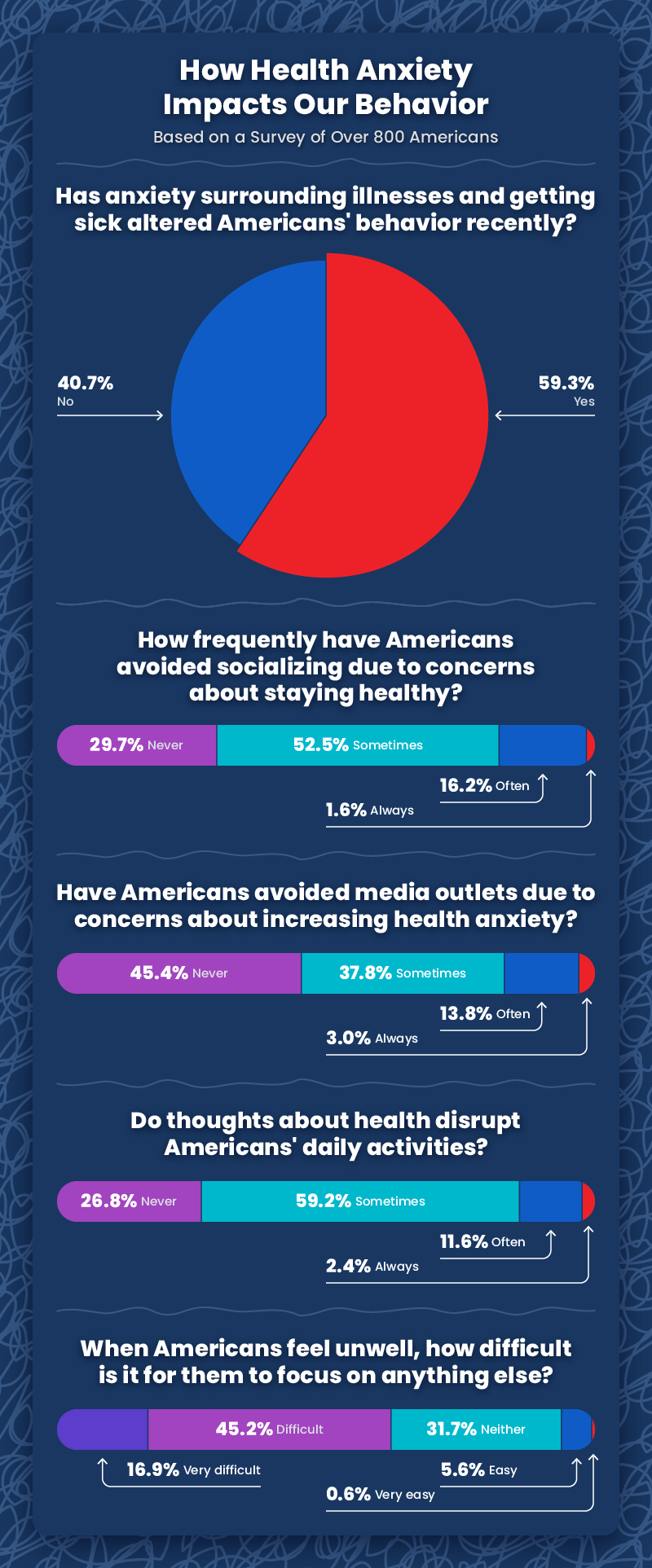
Americans aren’t just aimlessly worrying about their health either. While 59.1% say they’ve experienced more health anxiety since the start of the pandemic, 59.3% say that health anxiety has had an active effect on their decision-making. Specifically, 70.3% weigh health anxiety to some extent when deciding whether or not to socialize in-person while 54.6% take it into account when considering reading, watching, or listening to the news.
Health Anxiety and Our Pets

People aren’t just concerned with their own health, however. While a whopping 90.25% of Americans say they experience health anxiety at least occasionally, just under 30% of pet parents say they experience health anxiety regarding their pets. And of these pet parents, 58% say their own health gives them more anxiety, while 32.1% say their pets’ health gives them more anxiety. That means that, once people get a pet, there’s almost a one in three chance they start thinking about their pets’ health more often than even their own!
This idea is further supported by our next dataset, as, while only 37.4% of Americans will go to the doctor within the first three days of experiencing symptoms, the majority of respondents, 61%, will take their animal to the vet within the first three days of any symptoms appearing.
Closing Thoughts
To answer the question we posed in the title of this article, hypochondria is definitely around, as 9.62% of Americans self-identify as hypochondriacs, but the numbers tell us that the health anxiety that’s on the rise often comes in a less severe form. For example, while 11.6% of survey respondents said that health anxiety disrupts their daily thoughts often, and 2.4% said that disruption is a constant issue for them, 86% said they are only occasionally disrupted or never disrupted by thoughts of health anxiety.
It’s obvious that most pet parents care a lot about their animals. Some of the statistics that came up in this survey, like such a large percentage of respondents answering that their pets’ health often concerns them more than their own, is the kind of thing that we here at CertaPet can understand. Animals have such an incredible impact on our mental and emotional health, and many individuals turn to emotional support animals or psychiatric service dogs to help them cope with anxiety. If you think you might benefit from the support of an emotional support animal or psychiatric service dog, you can learn more about the process of getting a letter (a.k.a. prescription) for one on our website.
